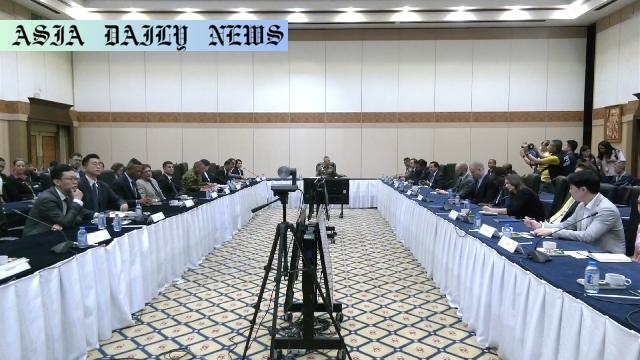Myanmar scams: Thai police and foreign officials collaborate to tackle scam hubs across Myanmar, ensuring safety of victims.
- Thai and foreign officials collaborate to counter Myanmar scams.
- 260 victims from scam centers in Myanmar were rescued.
- Concerns arise about distinguishing victims from scammers.
- Authorities focus on bilateral efforts to return the victims safely.

International Collaboration Against Myanmar Scams
In a concerted effort to tackle the rise of scams originating in Myanmar, Thai police recently convened with diplomats from 18 countries, including Japan, to develop a strategic approach. The meeting highlighted the growing challenges posed by cross-border scam operations and the need for enhanced international cooperation. In light of recent events, where 260 foreign nationals were rescued from exploitative conditions, the issue has gained significant attention at both national and global levels.
Understanding the Rescue Operations
Last week, Thai authorities took a decisive step by rescuing foreigners who were allegedly coerced into working for illicit scam centers situated near the Myanmar border. The rescued individuals hailed from 20 different countries and regions, showcasing the broad international implications of these criminal activities. Many of the victims had reportedly been confined and subjected to forced labor under harsh conditions. Among those rescued was a 17-year-old Japanese student, further highlighting the alarming scope of human trafficking tied to scam operations.
Addressing the Complexities of Victim Identification
One of the key challenges discussed during the meeting was the difficulty in distinguishing genuine victims from those who may have participated willingly in scams. Authorities are committed to conducting thorough investigations to uncover the full scope of these operations. A balanced approach is crucial to ensure that victims receive the necessary support while those involved in criminal activities face legal consequences.
The Role of Post-Coup Myanmar as a Scam Hub
Since the 2021 coup in Myanmar, the region has become a hotspot for foreign-run scam groups. Political instability and weak law enforcement have allowed these groups to thrive, exploiting individuals from various nationalities. Victims are often lured under false pretenses, only to find themselves confined and coerced into participating in fraudulent activities. The rise of these operations has caused significant harm, targeting vulnerable individuals globally, particularly the elderly.
Collaborative Efforts Towards Resolution
The meeting emphasized the importance of international collaboration in addressing this issue. Thai authorities plan to work closely with foreign embassies to assist in repatriating victims and ensuring their safe return to their home countries. Additionally, measures are being devised to prevent the recurrence of such incidents and to strengthen border monitoring.
Protecting the Most Vulnerable
One of the most concerning findings of this effort is the deliberate targeting of vulnerable groups, such as the elderly, by these scam operations. This exploitation not only causes financial loss but also emotional distress. Authorities in the affected countries need to raise awareness and educate citizens about common scam tactics to prevent victimization.
Future Steps in Combating Cross-Border Scams
Moving forward, the collaboration among Thai police, foreign representatives, and additional international agencies will play a crucial role in dismantling these operations. Enhanced intelligence sharing, joint task forces, and stricter monitoring of cross-border activities are pivotal to making sustained progress. The rescue of the 260 individuals is a significant milestone, but it represents just the beginning of a broader campaign against organized scam networks.



Commentary
A Wake-Up Call for Authorities
The recent crackdown on scam centers operating near the Thai-Myanmar border is a significant reminder of the scale and complexity of these criminal enterprises. It is commendable to see Thai authorities, alongside foreign representatives, taking a proactive stance against such exploitative activities. However, this issue requires consistent efforts and the unwavering cooperation of various nations if we are to make any meaningful headway.
The Human Cost of Scams
While the technical aspects of these scams are concerning, their human cost is even more alarming. Victims, many of whom are lured by false promises of legitimate work, are often subjected to inhumane conditions and psychological trauma. The rescue of 260 individuals highlights the dire need for immediate intervention and accessible support systems for victims. Moreover, the presence of minors, like the 17-year-old Japanese student in this case, adds an extra layer of urgency to this issue.
Why International Collaboration Is Key
Scam operations are rarely contained within one country’s borders. They exploit gaps in international enforcement and the slow pace of cross-border cooperation. This is why the meeting between Thai police and foreign officials is a promising development. By pooling resources, intelligence, and strategies, countries can create a united front against these networks. However, such initiatives must move beyond dialogue and translate into coordinated action plans.
Looking Ahead
While the rescue operations are a positive step, they are just the tip of the iceberg. Nations must strengthen their domestic policies to deter scam hubs from taking root while working with neighbors to eliminate existing networks. Awareness campaigns and accessible reporting mechanisms are also critical in equipping citizens to protect themselves. Only through a multi-faceted approach can we hope to curb the impact of such scams effectively.